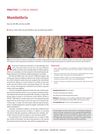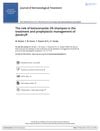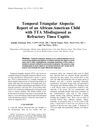Search
for
Sort by
Research
360-390 / 719 resultsresearch Changes of Serum Trace Elements Level in Patients with Alopecia Areata: A Meta-Analysis
Low serum levels of zinc and selenium may increase the risk of alopecia areata.

research Monilethrix
A three-year-old girl has hair loss despite treatment with selenium sulfide shampoo and anti-fungal medication.
research Clinical Signs and Laboratory Tests for the Differential Diagnosis of Androgenic and Post-COVID-19 Alopecia in Women
Post-COVID-19 hair loss is different from androgenetic alopecia and can be identified by lower copper and higher selenium levels.
research Dietary Patterns, Plasma and Hair Trace Element in Ukrainian Cohort of Adults During COVID-19 Pandemic: A Cross-Sectional Study
Good nutrition and essential trace elements like zinc, selenium, and iron are important for a strong immune system and reducing COVID-19 severity.

research Evaluation of Signs of Skin Aging in Patients with Metabolic Syndrome after Substitution Therapy with Antioxidants. Summary of the Doctoral Thesis
Antioxidant therapy, especially with selenium, can improve skin aging in patients with Metabolic Syndrome.
research Nutritional Skin Diseases in Goats
Some goats get rare skin diseases from not enough vitamin E, selenium, or zinc, but they're usually still healthy.
research Finding Evidence of the Efficacy and Safety of Selenium in Treating Hashimoto's Thyroiditis: A Systematic Literature Review
Selenium's effectiveness in treating Hashimoto's thyroiditis is inconclusive.

research The Role of Vitamins and Minerals in Hair Loss: A Review
Some vitamins and minerals like vitamin D and iron can help with certain types of hair loss, but more research is needed for others.
research Guidelines for the Management of Tinea Capitis in Children
Systemic treatment is necessary for tinea capitis in children, with griseofulvin preferred for Microsporum infections.
research Micronutrient Status in Patients Receiving Home Parenteral Nutrition
One-third of patients on home nutrition had micronutrient deficiencies, with iron deficiency being most common, but serious issues were rare.
research Hair Toxic and Essential Trace Elements in Children with Autism Spectrum Disorder
Children with autism have lower levels of essential and toxic trace elements in their hair.

research Hair Loss in Psychopharmacology
Some psychiatric medications can cause hair loss, but it usually grows back after adjusting the medication.

research Adverse Cutaneous Reactions to Mood Stabilizers
Mood stabilizers can cause serious skin reactions; careful monitoring and immediate treatment are crucial.
research Health Survey of Boreal Caribou (Rangifer Tarandus Caribou) in Northeastern British Columbia, Canada
Boreal caribou in northeastern British Columbia have significant health issues, including infections, tick infestations, and mineral deficiencies.

research The Role of Ketoconazole 2% Shampoo in the Treatment and Prophylactic Management of Dandruff
Ketoconazole shampoo treats dandruff and reduces hair greasiness.

research Expert Consensus on the Management of Telogen Effluvium in India
Indian dermatologists recommend treating common hair loss with a balanced diet, stress reduction, mild shampoos, and sometimes minoxidil and supplements.
research The Infected Hairs of Tinea Capitis Due to Microsporum Canis: Demonstration of Uniqueness of the Hair Cuticle by Scanning Electron Microscopy
The hair cuticle acts as a barrier against fungal infection, which occurs only deep within the hair follicle.

research A Case of Acute Telogen Effluvium After SARS-CoV-2 Infection
COVID-19 may trigger sudden temporary hair loss.

research Temporal Triangular Alopecia: Report of an African-American Child Misdiagnosed as Refractory Tinea Capitis
A child was initially wrongly diagnosed with a fungal scalp infection but actually had a non-scarring hair loss condition called Temporal Triangular Alopecia.
research Acquired Structural Defects of the Hair
External factors like certain shampoos, bacterial infections, and parasites might cause hair defects similar to genetic conditions.

research Role of Non-Androgenic Factors in Hair Loss and Hair Regrowth
Good nutrition is crucial for healthy hair and can help with hair loss without medication.
research Seborrhoeic Dermatitis in Pygmy Goats
Pygmy goats with seborrhoeic dermatitis showed skin symptoms and temporary improvement with corticosteroids, but the cause and inheritance of the disease remain unknown.

research Molecular Signaling and Nutritional Regulation in the Context of Poultry Feather Growth and Regeneration
Good feather growth in poultry needs the right balance of proteins, amino acids, minerals, and vitamins.

research Treatment Pearls From Europe
European dermatologic treatments focus on lifestyle and psychosocial factors, use diverse methods like baths and climate therapy, and emphasize the importance of diet and supplements for skin health.

research Effect of Iodine-Deficient Diets and Goitrogenic Substances on the Weight Growth of Wistar Rats
Iodine-deficient diets and antithyroid substances affected rat growth and behavior, but most adapted with positive weight gain.

research Therapy Experience in Alopecia After COVID-19
The treatment with an oral drug and topical lotion is effective and well-tolerated for hair loss after COVID-19.

research Unknown Safety Profile of Ingredients in Hair Supplements: A Call to Action for Improved Patient Safety
The conclusion is that hair supplement ingredients may be unsafe and should be disclosed and proven safe before use.

research Imbalance of Some Trace Elements and Their Correction in Alopecia Areata
Correcting trace element imbalances may help reduce alopecia areata symptoms.

research Hair Loss Therapies: A Review And Comparison Of Traditional And Modern Treatment Methods
Microneedling, PRP therapy, and pharmacological treatments show promise for hair loss, but more research is needed.